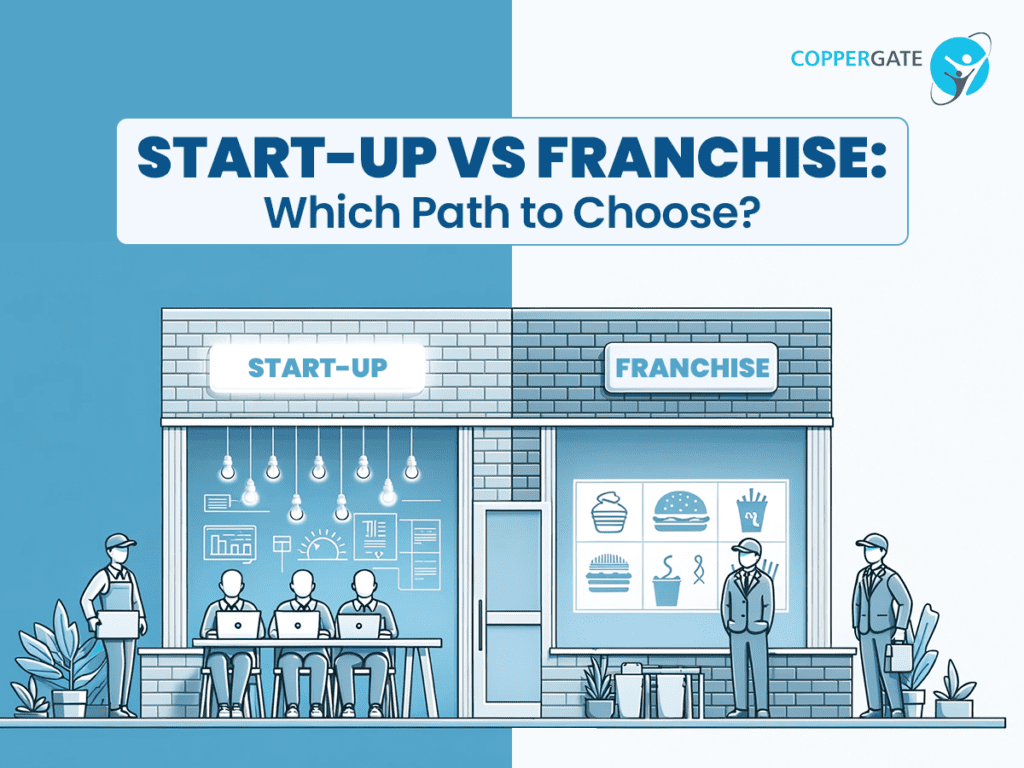In the realm of entrepreneurship, individuals are often faced with the dilemma of whether to embark on a franchise or a start-up venture. While both routes hold promises of success, they vary significantly in terms of structure, investment requirements, and potential returns. Both avenues offer distinct advantages and challenges, catering to different aspirations, risk appetites, and skill sets.
Understanding the nuances of each option is essential for aspiring business owners to make an informed choice that aligns with their goals and circumstances.
This article delves into the comparative analysis of franchises and start-ups, helping aspiring entrepreneurs in determining the most suitable path for their entrepreneurial journey.
Franchise vs. Start-up: Understanding the Dynamics
Starting a business from the ground up allows for unparalleled creativity and autonomy. Entrepreneurs have the liberty to shape their vision, develop unique offerings, and establish their brand identity. However, this route demands substantial time, effort, and financial investment. Moreover, navigating the complexities of market research, product development, and establishing a customer base can be daunting.
On the contrary, franchising offers a structured and proven business model, significantly reducing the risks associated with entrepreneurship. Franchisees gain access to established brand recognition, operational guidelines, and ongoing support from the franchisor. Additionally, the franchise model often facilitates easier access to financing, as lenders perceive franchised businesses as less risky ventures.
Let’s look at the positives of each business model in more detail.
Franchise: A Blueprint for Success:
While both franchise ownership and independent entrepreneurship have their merits, several compelling reasons may tilt the scale in favor of franchising. This section looks at the pros of franchising and gives you reasons as to why you should buy a franchise instead of starting a business from scratch.
Let’s dive in…
Franchising presents an enticing proposition for individuals seeking a proven business model with established brand recognition and operational guidelines. As a franchisee, entrepreneurs leverage the reputation and support system of an existing brand, mitigating some of the risks associated with independent ventures.
Established Brand Identity:
One of the primary allurements of franchising is the opportunity to partner with a recognized brand. Franchisees benefit from consumer trust and loyalty already associated with the brand, facilitating customer acquisition and retention.
Operational Support:
Franchisors offer comprehensive training programs and operational manuals, equipping franchisees with the requisite skills and knowledge to manage the business efficiently. Moreover, ongoing support in areas such as marketing, supply chain management, and technology integration alleviates the burden of operational complexities.
Reduced Risk:
The structured nature of franchising minimizes certain risks inherent in start-up ventures. Franchisees operate within a proven business model with a track record of success, reducing the likelihood of failure compared to independent start-ups.
Access to Financing:
Securing financing for franchise ventures tends to be more straightforward compared to start-ups, as banks and financial institutions perceive franchising as a less risky investment due to its established framework and brand equity.
Start-up: Nurturing Entrepreneurial Vision:
Contrary to franchising, start-ups epitomize the essence of innovation, enabling entrepreneurs to bring their creative ideas to fruition. While inherently riskier than franchising, start-ups offer unparalleled flexibility, autonomy, and potential for exponential growth.
Unlimited Creativity:
Start-ups provide entrepreneurs with the freedom to innovate and disrupt existing industries with novel solutions. Entrepreneurs have the liberty to shape every aspect of their venture, from product development to branding strategies, in alignment with their vision.
Potential for High Returns:
While start-ups entail greater risk, they also offer the possibility of substantial returns on investment. Successful start-ups have the potential to scale rapidly and capture significant market share, leading to lucrative exits through acquisitions or initial public offerings (IPOs).
Flexibility and Autonomy:
Start-up founders retain complete control over decision-making processes, allowing for agile responses to market dynamics and customer feedback. The absence of rigid corporate structures enables entrepreneurs to pivot strategies swiftly and capitalize on emerging opportunities.
Building from the Ground Up:
Unlike franchises that operate within established frameworks, start-ups afford entrepreneurs the opportunity to build their enterprise from the ground up, imbuing a sense of ownership and pride in the venture’s success.
Is Franchising Right for You?
If you are still confused between the two models then this section will help you get more clarity on whether franchising is the right path for you.
Determining whether franchising is the ideal path for your entrepreneurial journey requires careful consideration of various factors.
Here are some key questions to ponder:
Are you willing to operate within established parameters? Franchisees must adhere to the franchisor’s guidelines and standards, limiting creative freedom but ensuring consistency across locations.
How much autonomy do you desire? While franchises offer a structured framework, independent businesses provide greater flexibility in decision-making and strategic direction.
What level of support do you need? Franchisees benefit from comprehensive training, marketing assistance, and ongoing guidance from the franchisor, whereas independent entrepreneurs must navigate challenges independently.
Are you comfortable with shared profits? Franchisees typically pay royalties and fees to the franchisor in exchange for brand association and support, whereas independent business owners retain full control over profits.
What is your risk tolerance? Franchising may offer a more secure investment opportunity with proven success rates, whereas start-ups entail higher levels of uncertainty and risk.
Now if you think that franchising might be the right path for you and if you feel confident enough to take up the franchise path then you can check out the article Top 10 Franchises in India.
Also, if you wish to partner with Coppergate feel free to reach out to us at contact@coppergate.in.
Conclusion:
Ultimately, the choice between franchising and starting a business hinges on individual preferences, risk appetite, and long-term goals. While franchising offers a structured and supported pathway to entrepreneurship, independent start-ups provide unparalleled autonomy and creative freedom. By carefully evaluating the pros and cons of each option and conducting thorough due diligence, aspiring entrepreneurs can make informed decisions that align with their objectives.
Aspiring entrepreneurs must conduct thorough due diligence, introspect on their aspirations and capabilities, and align their decision with the path that best resonates with their entrepreneurial journey. Whether opting for the structured framework of franchising or the boundless possibilities of start-ups, embarking on the path of entrepreneurship requires unwavering dedication, resilience, and a willingness to embrace uncertainty in pursuit of success.




